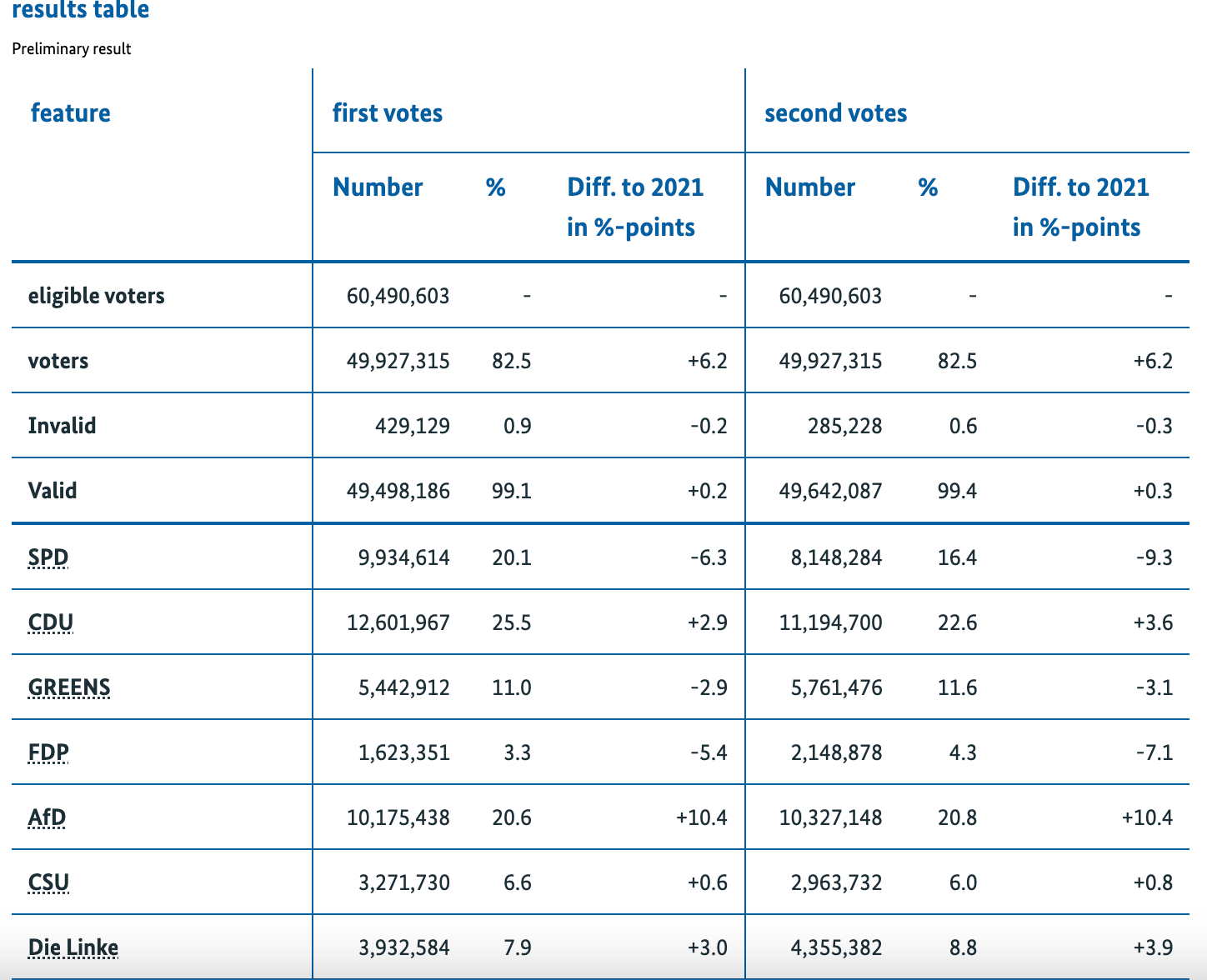Monday in Germany.
News Items, Part One
Each morning, News Items brings me the world in a bottle. — Philip K. Howard.
1. Via Bloomberg, here are the key events of last night now that the Federal Returning Officer has published the preliminary results of the German elections:
Friedrich Merz’s center-right conservative alliance won the election as projected, taking 28.6% of the vote.
The far-right Alternative for Germany came second on 20.8%, doubling its share from the last election in 2021.
Chancellor Olaf Scholz’s Social Democrats crashed to their worst result since World War II on 16.4% and the Greens were fourth on 11.6%.
Merz is on course to replace Scholz as chancellor but will need a coalition partner to secure a parliamentary majority.
Both the business-friendly Free Democrats and the far-left BSW party failed to reach the 5% threshold for getting seats in the Bundestag.
That means Merz would be able to form a two-way coalition with the SPD and doesn’t need the Greens to make up the numbers in the Bundestag.
The conservative leader said he wants his new government in place by Easter at the latest-- which gives him just under two months. (Sources: bundeswahlleiterin.de, bloomberg.com)
2. Charts from Germany’s Federal Returning Office:
(Source: bundeswahlleiterin.de)
3. The New York Times:
Germans voted for a change of leadership on Sunday, handing the most votes in a parliamentary election to centrist conservatives, with the far right in second, and rebuking the nation’s left-leaning government for its handling of the economy and immigration.
The results almost certainly mean the country’s next chancellor will be Friedrich Merz, leader of the Christian Democrats. Returns posted early Monday morning indicated that he had a path to governing Germany with only one coalition partner, the relatively stable scenario that his party had hoped for.
“We have won it,” Mr. Merz told supporters in Berlin on Sunday evening, promising to swiftly form a parliamentary majority to govern the country and restore strong German leadership in Europe.
The election, which was held seven months ahead of schedule after the collapse of Chancellor Olaf Scholz’s unpopular and long-troubled three-party coalition, will now become an essential part of the European response to President Trump’s new world order. It drew the highest voter turnout in decades. (Source: nytimes.com)
4. DW.com:
It is a historic result for the Alternative for Germany party (AfD): just 12 years after the far-right party was founded, it has become the second largest political force in Germany.
With ~21% of the vote, it almost doubled its result from the last German election in 2021….
On election night, the AfD lead candidate Alice Weidel stressed again that her party is willing to enter into a coalition with the winning center-right alliance of the Christian Democratic Union (CDU) and its Bavarian sister party, the Christian Social Union (CSU).
At the same time, she lashed out at the CDU's leader and likely next chancellor Friedrich Merz.
In reference to Merz's promise made several years ago to halve the AfD's vote share, Weidel told her supporters: "They wanted to halve us, but the opposite has happened!" (Source: dw.com)
5. As expected, the far-right Alternative for Germany (AfD) performed strongly in the former communist eastern states, where many voters feel ignored by mainstream parties. The anti-immigrant AfD placed first in all five eastern regions excluding the capital Berlin, with its share of the vote ranging from 38.6% in Thuringia to 32.5% in Brandenburg. In Berlin, the Left party, which traces its roots to East Germany’s Socialist Unity Party, was the strongest force at 19.9%. (Source: bloomberg.com)





